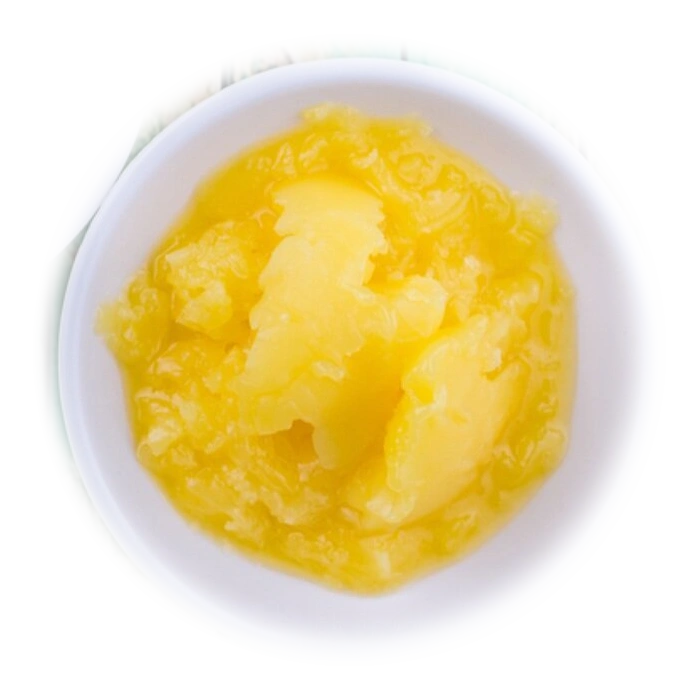
Nutritional properties of Turkey oil
Energy :
None Kcal / 100g
Category : Oils and Fats
Group : Animal Fats & Oils
Composition And Nutritional Value :Turkey oil is a fat extracted from the skin and fatty tissues of turkeys. It is composed primarily of unsaturated fats, including monounsaturated fats and polyunsaturated fats, with a smaller proportion of saturated fats. This oil is rich in oleic acid, a monounsaturated fat that is beneficial for cardiovascular health. Turkey oil also contains a mix of omega-3 and omega-6 fatty acids, which are essential for promoting heart health and maintaining proper brain function. Additionally, it provides vitamin E, an antioxidant that supports skin health and helps protect the body against oxidative stress.
Health Benefits :
Heart Health: Turkey oil contains a significant amount of monounsaturated fats like oleic acid, which has been shown to lower LDL cholesterol (bad cholesterol) while raising HDL cholesterol (good cholesterol). This can help reduce the risk of heart disease.
Skin Health: Like other animal fats, turkey oil is rich in vitamin E, which helps in maintaining skin health and protecting it from damage caused by free radicals. It also has moisturizing properties, which makes it a potential ingredient in skin care products.
Anti-Inflammatory: The omega-3 fatty acids in turkey oil have anti-inflammatory properties and may help alleviate conditions such as arthritis and joint pain. These fatty acids also support cognitive function and brain health.
Boosting Immunity: The omega-3s and other nutrients found in turkey oil are believed to help in boosting the immune system, supporting overall health and protection against infections.
Energy Source: The fats in turkey oil provide a concentrated energy source and can be used as a nutrient-dense addition to meals when consumed in moderation.
Culinary Uses : Turkey oil is primarily used in cooking to enhance the flavor and texture of various dishes. It is often used as a cooking fat, especially for roasting and frying. The oil’s high smoke point (around 375°F/190°C) makes it ideal for high-heat cooking methods like sautéing and frying. Turkey oil is commonly used in roasting turkey, as it helps keep the meat moist and adds a rich flavor. The oil is also used to fry potatoes, vegetables, and chicken, imparting a savory and slightly gamey taste to these foods. It can be used as a base for gravies or added to sauces for extra flavor. Additionally, it can be used in baking recipes, particularly for savory pies and pastries, where its richness enhances the overall taste and texture.
Types :
Rendered Turkey Oil: This is the most common form, created by slowly cooking down turkey fat, typically from the skin and abdominal area, to extract the oil. It is generally sold as a liquid fat that solidifies when cooled.
Turkey Fat: Sometimes, turkey fat is sold in its raw form before it is rendered into oil. This fat can be rendered at home for use in cooking or frying.
Turkey Oil Blends: Some commercially available turkey oil is mixed with other vegetable oils to reduce cost and increase shelf life. These blends may not have the full richness of pure turkey oil but still provide some of the flavor benefits.
Shopping And Storage Tips :
Selecting Turkey Oil: When purchasing turkey oil, look for high-quality rendered fat that has not been mixed with additives or preservatives. If buying from a butcher, ensure the oil is fresh and free from contamination.
Storage: Turkey oil should be stored in an airtight container in a cool, dark place. If storing for long periods, it is best to refrigerate or freeze it to preserve its freshness.
Shelf Life: When stored correctly, turkey oil can last for several months in the refrigerator and up to a year in the freezer. Before use, check for any signs of rancidity, such as off odors or unusual colors.
Usage Tips: When using turkey oil for cooking, apply it as you would use any other cooking fat, like butter or vegetable oil. It can be used for roasting, frying, or sautéing. Because of its rich flavor, a little goes a long way, so use sparingly in dishes where you want to enhance the savory taste.
Turkey oil is a flavorful and versatile cooking fat that offers several health benefits, particularly when used in moderation. Its rich, savory taste and high smoke point make it an excellent choice for high-heat cooking and roasting, and it adds a unique depth of flavor to many dishes.

